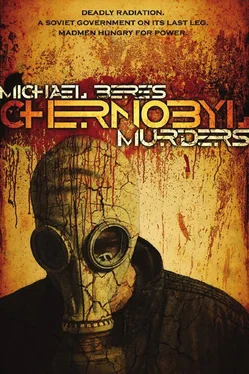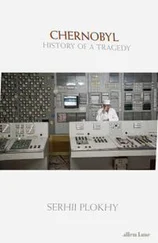Michael Beres - Chernobyl Murders
Здесь есть возможность читать онлайн «Michael Beres - Chernobyl Murders» весь текст электронной книги совершенно бесплатно (целиком полную версию без сокращений). В некоторых случаях можно слушать аудио, скачать через торрент в формате fb2 и присутствует краткое содержание. Жанр: Триллер, на английском языке. Описание произведения, (предисловие) а так же отзывы посетителей доступны на портале библиотеки ЛибКат.
- Название:Chernobyl Murders
- Автор:
- Жанр:
- Год:неизвестен
- ISBN:нет данных
- Рейтинг книги:4 / 5. Голосов: 1
-
Избранное:Добавить в избранное
- Отзывы:
-
Ваша оценка:
- 80
- 1
- 2
- 3
- 4
- 5
Chernobyl Murders: краткое содержание, описание и аннотация
Предлагаем к чтению аннотацию, описание, краткое содержание или предисловие (зависит от того, что написал сам автор книги «Chernobyl Murders»). Если вы не нашли необходимую информацию о книге — напишите в комментариях, мы постараемся отыскать её.
Chernobyl Murders — читать онлайн бесплатно полную книгу (весь текст) целиком
Ниже представлен текст книги, разбитый по страницам. Система сохранения места последней прочитанной страницы, позволяет с удобством читать онлайн бесплатно книгу «Chernobyl Murders», без необходимости каждый раз заново искать на чём Вы остановились. Поставьте закладку, и сможете в любой момент перейти на страницу, на которой закончили чтение.
Интервал:
Закладка:
Although his position in Kiev was a reward for years of GDR service, although even he at first valued the position, at age forty-five he felt stagnant. Was it time for the ruthless Komarov, who had created and solved the Sherbitsky crime so efficiently, to come out of hiding?
The phone rang and Komarov left the window to answer it.
Captain Azef from two floors below said his weekly report from Chernobyl was ready. He told Azef to bring the report to his office in five minutes.
Back at the window, Komarov lit a cigarette. When Captain Azef arrived, he would, as usual, comment on the view. Komarov’s window faced the length of Boulevard Shevchenko as it exited the city and continued northwest over the hills. Up and down went Boulevard Shevchenko, up and down like life. In Berlin, after becoming captain, Komarov had played hard, meeting many women without his wife’s knowledge. Now he only drank hard, the vodka bottle dominating yet giving him solace. It helped him forget his son, recently ejected from university, was a lover of men disguised as a would-be artist. It helped him forget his wife, who catered to their son, was interested only in social position and fashions of the West.
His climb into the bottle had unearthed past dreams of success. The Sherbitsky affair had served him well. But how could he create a modern plan with national implications? A plan to garner the prestige needed to take over Dumenko’s chairmanship? He was forty-five years old, his wife and son were foreign to him, he drank too much, and time was running out.
He coughed several times, turned from the window, and coughed repeatedly into his handkerchief. He put his cigarette out angrily amid dozens of others in the ashtray. There was a knock at the door.
“Come in!” he shouted and coughed again after he sat at his desk.
The stack of folders Captain Azef placed on Komarov’s desk was formidable, and Azef was short, only his smiling face and bald head visible above the documents after he sat down.
“How are you this fine morning, Major?”
“As well as can be expected, Captain.”
“I heard your cough.” Azef glanced at the ashtray. “The cigarettes do not help?”
“A difficult habit to overcome,” said Komarov, glaring at Azef.
“Sorry, Major. You said to remind you from time to time about the need to reduce the number of cigarettes.”
“I don’t smoke when we’re in the car anymore.”
“But you seem to make up for it here. I’m simply trying to be helpful.”
“Helpful,” said Komarov. “Get on with the report.”
Because the summer holiday season was ending, there was an extensive summary of where personnel had traveled. Many visited Black Sea resorts to turn their skin to leather. Some returned to villages where they had grown up. A handful crossed the frontier, but these were officials of the Ministry of Energy whose whereabouts were monitored by the committee office.
Another summary listed unusual absences from work. In the fall this list would lengthen with illnesses, but now, in warm weather, there were few unplanned absences. The list included two pregnancies, an appendectomy, a gall-bladder operation, a death due to an automobile accident, and a hospitalization for lung cancer. The mention of lung cancer made Komarov think of the cigarette pack in his shirt pocket. He fought the urge to light up and concentrated on Azef’s report.
The last unplanned absence was for an engineer who suddenly went mad, telling everyone reactor unit one, to which he was assigned, was going to blow up. The engineer referred to a 1982 accident during his outburst, a minor accident that was supposed to be secret. The engineer stayed home and refused to return to work.
Eventually, the Institute for Mental Health took him away. Komarov knew this meant confinement for several years. There was nothing for the KGB to do in the matter except to continue monitoring the man’s co-workers.
The report from agents at post offices and telephone exchanges was routine. No questionable letters or telephone calls. Of course, during the holiday season, with staff being shorthanded, less than five percent of calls and letters had been examined.
“We should increase our monitoring here,” said Komarov.
Azef nodded. “I contacted Captain Putna at the PK.”
“I want the next report back up to ten percent.”
“Yes, Major. I told Putna ten percent.”
“Good,” said Komarov, somewhat angrily.
The summary of rumor and gossip was more interesting. An electrician at the facility told co-workers, ever since he began working near the reactors, his hair had begun to quickly turn gray. Because the man’s hair was indeed turning gray, news spread quickly. But finally, the man’s superior determined the man had been coloring his hair for years and suddenly stopped.
The engineer going mad and claiming unit one was going to explode caused several spin-off rumors. One claimed the Ministry of Energy in Moscow had, for some reason, decided to experiment with safety limits at Chernobyl. Chief engineers met this rumor with denial and disciplinary action. Next was a rumor claiming chief engineers were technically unqualified. This rumor died out on its own after a time because it was viewed as reactionary.
Each week the report contained new jokes circulating. Last week’s big joke had been about eating the food in the cafeteria. It was okay to eat there, the joke went, as long as you shit in a lead box. This week’s joke dealt with nuclear engineers being sent on a fact-finding tour of U.S. reactors. Engineers were going to Three Mile Island in order to model safety at their own facility after the safety procedures at a reactor with a stellar record. Only one accident!
“Our internal agents overheard several persons exchanging the joke firsthand,” said Azef, handing Komarov a list of names.
The last summary in the report on Chernobyl personnel was Captain Azef’s favorite. Azef took delight in detailing sexual relationships among facility personnel. Because of his own son’s sexual orientation, Komarov was glad to hear there were no new reports of homosexual encounters in the locker rooms.
Azef handed over a list of couples allegedly having affairs. The list contained details of four relationships.
“You will notice,” said Azef, “one of the women appears on this list, as well as on the one concerning the new joke.”
“I can read,” said Komarov.
“And you will also notice the man she is servicing is married.”
“Perhaps he is servicing her.”
Azef laughed. “Very good, Major. In any case, because he is a senior engineer and she has appeared on two lists this week, I’ve taken the initiative to retrieve their files.”
Komarov opened the files and scanned the personal summary sheet for each. Juli Popovics, lab technician at the low-level laboratory. Mihaly Horvath, senior reactor control engineer. Both residents of Pripyat. But unless they wished to live in one of the backward villages and suck salt pork, workers at Chernobyl had only two choices of where to live, either in the town of Chernobyl or the larger, more modern town of Pripyat. And then the file reminded Komarov of two other interesting facts. Both had Hungarian lineage, and Mihaly Horvath’s brother was Detective Lazlo Horvath of the Kiev militia. Komarov closed the folders.
“What do you suggest?” asked Azef.
“Put both under operational observation.”
Azef took a notebook from his pocket. “Anything else?”
“Arrange for Engineer Horvath’s wife to discreetly find out about the affair. You knew it’s what I would order, didn’t you, Captain?”
“Yes, Major.”
But Captain Azef did not know everything, did not know a directive had come from Deputy Chairman Dumenko’s office at KGB headquarters in Moscow to be read only by Komarov. The directive had instructed him to watch for rumors of inadequate safety at Chernobyl and to act accordingly to squelch the rumors. The directive also said to watch for the possibility of U.S. intelligence involvement. No reason was needed for an order from Moscow.
Читать дальшеИнтервал:
Закладка:
Похожие книги на «Chernobyl Murders»
Представляем Вашему вниманию похожие книги на «Chernobyl Murders» списком для выбора. Мы отобрали схожую по названию и смыслу литературу в надежде предоставить читателям больше вариантов отыскать новые, интересные, ещё непрочитанные произведения.
Обсуждение, отзывы о книге «Chernobyl Murders» и просто собственные мнения читателей. Оставьте ваши комментарии, напишите, что Вы думаете о произведении, его смысле или главных героях. Укажите что конкретно понравилось, а что нет, и почему Вы так считаете.












